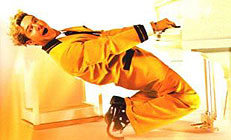|
|
|
|
Great
Balls of Fire!
|
 |
|
It is 1956, and twenty-one year-old Jerry Lee Lewis is becoming a mite restless. Several days have passed since he delivered his demo tape to legendary Sun Records manager Sam Phillips, and he has heard nothing back. So Jerry jumps in his car, aiming to burn of his frustration on the night streets of Memphis, Tennessee. At the same moment, in his studio, Phillips is listening to the first notes of Lewis' "Crazy Arms". "I can sell that!" he yells, and then seemingly instantaneously, cuts a disc of it and puts it straight onto the radio airwaves. Jerry Lee hears it in his car, goes wild at the wheel, and ends up in an instant back on his front lawn, greeted by fans and pursued by cops. This all happens in three minutes of Great Balls of Fire! – the length of one song. Goodness gracious! I believe there are only two kinds of film reviewers: those who can appreciate the genius of American director Jim McBride, and the others. I am happy to be in the former camp. For those who love the insane energy and lyrical rapture of McBride's Breathless (1983) and The Big Easy (1986), Great Balls of Fire! will naturally be of immense interest. Even for the uninitiated, however, it is well worth a look. Not that McBride makes it easy for the public at large to love him as it should. Despite all its obvious selling points – a rock 'n' roll biopic with wall-to-wall music and Dennis Quaid's amazing portrayal of Jerry Lee – the film did not do as well as its producers might have expected. Is it because McBride invests Jerry Lee Lewis with a no-holds-barred intensity that is as scary and strange as it is exhilarating? Because the film does not shrink from the fact that there is something rather perverse and demented about this man, who took a blushing thirteen year-old (played by Winona Ryder) for his wife? Because the film is, in effect, the story of a man who lost his shot at the big time in the explosive meeting of his wild nature with the conservative '50s? If all this made Great Balls of Fire! slightly difficult to market, its style makes it even more so. McBride always takes chances; here, he adopts a method that can only be cartoonish. Time and space are telescoped wildly, actors mug and contort frantically, and there are gags that defy all realistic constraints. Not since the manic, erotically charged cartoons made by Tex Avery at MGM in the 1940s has there been such energy and freedom unleashed on the screen. McBride chooses to paint, whenever possible, a social and cultural panorama. Great Balls of Fire! is about the '50s – specifically, the development of the American youth culture after the emergence of Elvis Presley and James Dean. McBride's vision of this development is fascinatingly ambivalent. On the one hand, rock 'n' roll is still very much "the devil's music", and youth still means rebellion against authority. On the other hand, while the black Civil Rights movement is springing up around Lewis (and it was from black music that he adapted his distinctive style), white America is becoming obsessively consumerist – made hilariously clear as Lewis' young wife shops for her 1950s-style "home of tomorrow". Ultimately, he is an enigma. But Lewis is still the hero of this glorious movie, because he remains to the end, as he puts it, a "real wild child" – a symbol of the unadulterated, unsocialised, libidinal energy of youth. McBride seconds that emotion and the result is memorable. MORE McBride: David Holzman's Diary, The Wrong Man © Adrian Martin November 1989 |
![]()